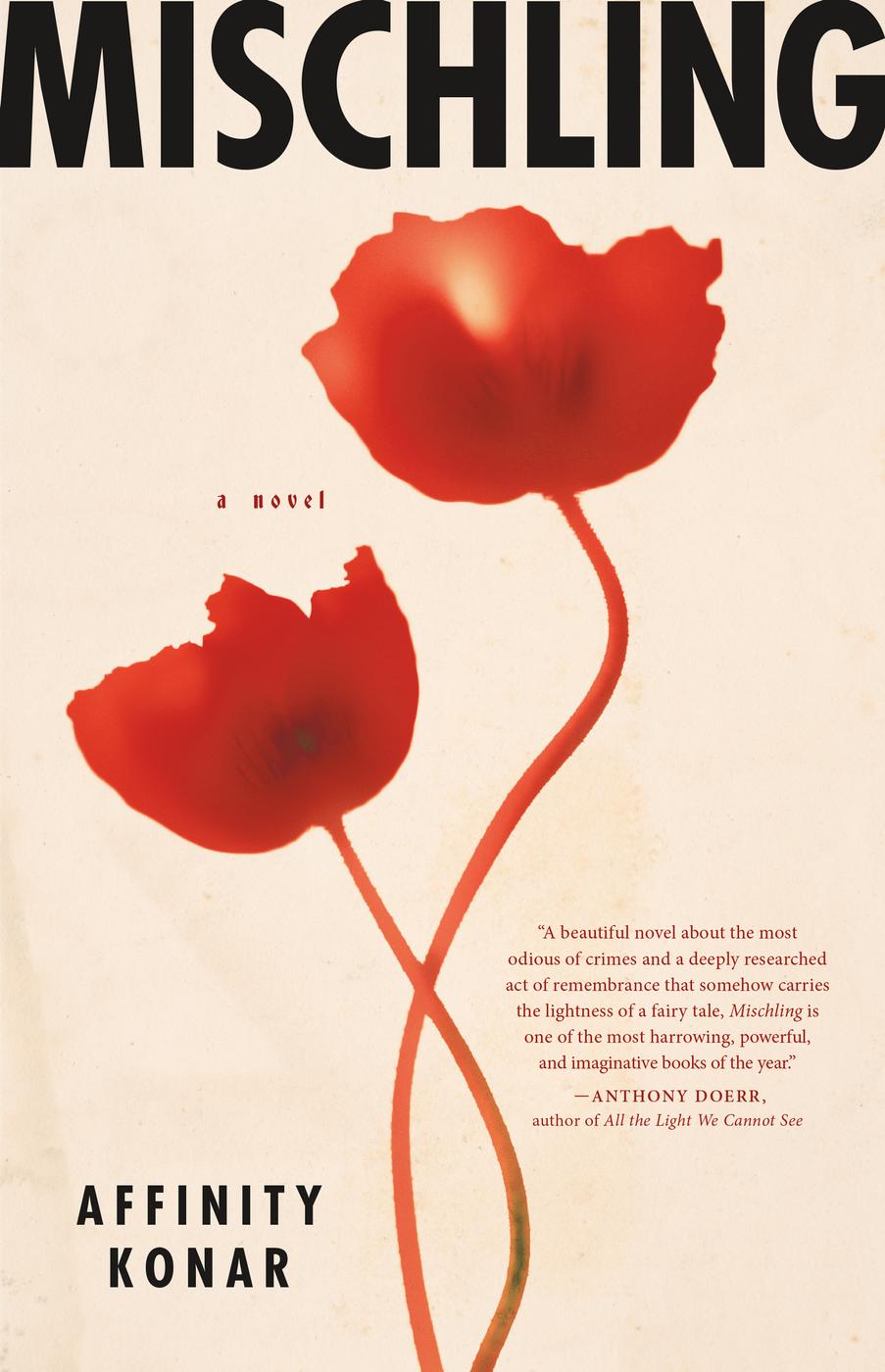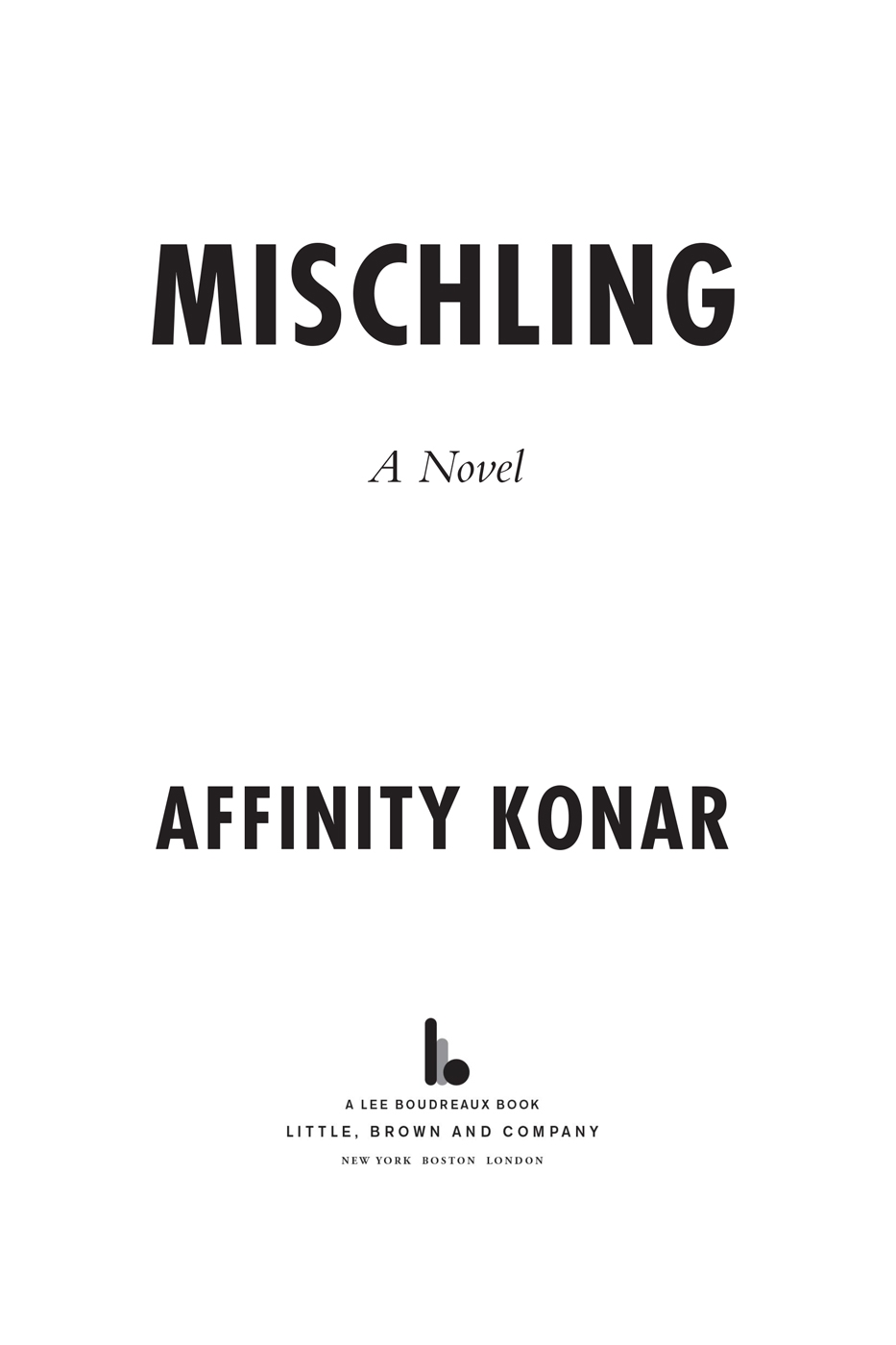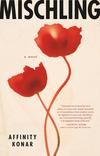Mischling
Authors: Affinity Konar




Hachette Book Group supports the right to free expression and the value of copyright. The purpose of copyright is to encourage writers and artists to produce the creative works that enrich our culture.
The scanning, uploading, and distribution of this book without permission is a theft of the author's intellectual property. If you would like permission to use material from the book (other than for review purposes), please contact [email protected]. Thank you for your support of the author's rights.
Â
Â
Â
Â
For Philip and for my family
We were made, once. My twin, Pearl, and me. Or, to be precise, Pearl was formed and I split from her. She embossed herself on the womb; I copied her signature. For eight months we were afloat in amniotic snowfall, two rosy mittens resting on the lining of our mother. I couldn't imagine anything grander than the womb we shared, but after the scaffolds of our brains were ivoried and our spleens were complete, Pearl wanted to see the world beyond us. And so, with newborn pluck, she spat herself out of our mother.
Though premature, Pearl was a sophisticated prankster. I assured myself that it was just one of her tricks; she'd be back to laugh at me. But when Pearl failed to return, I lost my breath. Have you ever had to live with the best part of yourself adrift, stationed at some unknowable distance? If so, I am sure you are aware of the dangers of this condition. After my breath left me, my heart followed suit, and my brain ran with an unthinkable fever. In my fetal pinkness, I faced this truth: without her, I would become a split and unworthy thing, a human incapable of love.
That is why I followed my sister's lead and allowed the doctor's hands to tear me out and smack me and hold me to the light. Let us note that I never cried during the ruptures of this unwanted transition. Not even when our parents ignored my wish to be named Pearl too.
I became Stasha instead. And with the chore of birth complete, we entered the world of family and piano and book, of days that baffled by in beauty. We were so alikeâwe were always dropping marbles from the window onto the paving stones and watching them descend the hill with our binoculars, just to see how far their little lives would take them.
That world, teeming with awe, ended too. Most worlds do.
But I must tell you: There was another world we knew. Some say it was the world that made us the most. I want to say that they are wrong, but for now, let me tell you that our entry into this world began in our twelfth year of life, when we were huddled side by side in the back of a cattle car.
During that journey of four days and four nights, we cheated our way into survival under Mama's and Zayde's instruction. For sustenance, we passed an onion back and forth and licked its yellow hide. For entertainment, we played the game Zayde made for us, a game called the Classification of Living Things. In this form of charades, you had to portray a living thing, and the players had to name the species, the genus, the family, and so on, all the way to the encompassing brilliance of a kingdom.
The four of us passed through so many living things in the cattle car; we postured from bear to snail and backâit was important, Zayde emphasized in his thirst-cracked voice, that we organize the universe to the best of our too-human abilityâand when the cattle car finally came to a stop I stopped my charade too. The way I remember it, I was in the middle of trying to convince Mama that I was an amoeba. It's possible that I was portraying some other living thing and that I am remembering it as an amoeba now only because I felt so small in that moment, so translucent and fragile. I cannot be sure.
Just as I was about to admit defeat, the door to the cattle car rolled open.
And the incoming light was so startling that we dropped our onion on the floor, and it rolled down the ramp, a smelly and half-eaten moon that landed at the feet of a guard. I imagine that his face was full of disgust, but I couldn't see itâhe held a kerchief over his nostrils while issuing a series of sneezes, and he stopped sneezing only to hover his boot above our onion and cast an eclipsing shadow over the tiny globe. We watched the onion weep as he crushed it, its tears a bitter pulp. He then resumed his approach, and we scrambled to hide in the shelter of Zayde's voluminous coat. Though we had outgrown Zayde as a hiding place long ago, fear made us smaller, and we contorted within the coat folds beside his dwindled body, leaving our grandfather a lumpy, many-legged figure. In this shelter, we blinked. Then we heard a soundâa stomp, a shuffleâthe guard's boots were immediately before us.
“What kind of insect are you?” he asked Zayde, rapping each of the girlish legs that emerged beneath the coat with a walking stick. Our knees smarted. Then the guard struck Zayde's legs too. “Six legs? You are a spider?”
It was clear that the guard had no real understanding of living things at all. Already, he'd made two errors. But Zayde didn't bother to point out that spiders aren't insects and that, in fact, they are possessors of eight legs. Traditionally, Zayde enjoyed issuing playful, singsong corrections, as he liked to see all the facts put to rights. In that place, thoughâit was too dangerous to express any intimate knowledge of creatures that crawled or were considered lowly, lest you be accused of bearing too much in common with them. We should have known better than to make an insect of our grandfather.
“I asked you a question,” the guard insisted while issuing another rap to our legs with his stick. “What kind?”
In German, Zayde gave him facts: His name was Tadeusz Zamorski. He was sixty-five years old. He was a Polish Jew. He ended there, as if all were told.
And we wanted to continue for him, we wanted to give all the details: Zayde was a former professor of biology. He'd taught the subject at universities for decades but was an expert in many things. If you wanted to know about the insides of a poem, he would be the one to ask. If you wanted to know how to walk on your hands or find a star, he'd show you. With him, we once saw a rainbow that ran only red, saw it straddle a mountain and a sea, and he toasted the memory of it often.
To unbearable beauty!
he'd cry, eyes abrim. He was so fond of toasts that he made them indiscriminately, for nearly any occasion.
To a morning swim! To the lindens at the gate!
And in recent years, there was this, his most common toast:
To the day my son returns, alive and unchanged!
But as much as we would have liked to, we said nothing of these things to the guardâthe details caught in our throats, and our eyes were tearful because of the death of the nearby onion. The tears were the onion's fault, we told ourselves, nothing more, and we wiped the drops away so that we could see what was happening through the holes in Zayde's coat.
Encircled in the portholes of these flaws were five figures: three little boys, their mother, and a white-coated man who stood with a pen cocked over a little book. The boys intrigued usâwe'd never seen triplets before. In Lodz, there had been another set of girl twins, but a trio was the stuff of books. Though we were impressed by their number, we had to admit that we trumped them in terms of identicality. All three had the same dark curls and eyes, the same spindly bodies, but they wore different expressionsâone squinted at the sun, while the other two frowned, and their faces fell into similarity only when the white-coated man distributed candy into each of their palms.
The triplets' mother was different than all the other mothers of the cattle carâher distress was neatly tucked away, and she stood as still as a stopped clock. One of her hands drifted over her sons' heads in some perpetual hesitation, as if she felt that she no longer had the right to touch them. The white-coated man did not share this attitude.
He was an intimidating figure, all shiny black shoes and dark hair of equal polish, his sleeves so expansive that when he lifted an arm, the fabric below billowed and winged and claimed a disproportionate measure of sky. He was movie-star handsome and prone to dramatics; kindly expressions swelled across his face with obviousness, as if he was eager to let everyone near know the extremity of his good intentions.
Words passed between the mother and the white-coated man. They seemed like agreeable words, though the man did most of the talking. We wished we could hear the conversation, but it was enough, I suppose, to see what happened next: the mother passed her hands over the dark clouds of the triplets' hair, and then she turned her back, leaving the boys with the white-coated man.
He was a doctor, she said as she walked away, a falter in her step. They would be safe, she assured them, and she did not look back.
Our mother, hearing this, gave a little squeak and a gasp before reaching over to tug at the guard's arm. Her boldness was a shock. We were used to a trembling mother, one who always shook while making requests of the butcher and hid from the cleaning woman. Always, it was as if pudding ran through her veins, making her constantly aquiver and defeatable, especially since Papa's disappearance. In the cattle car, she'd steadied herself only by drawing a poppy on the wooden wall. Pistil, petal, stamenâshe drew with a strange focus, and when she stopped drawing, she went to pieces. But on the ramp she discovered a new solidityâshe stood stronger than the starved and weary should ever stand. Was the music responsible for this alteration? Mama always loved music, and this place was teeming with bright notes; they found us in the cattle car and drew us out with a distrustful cheer. Over time, we'd learn the depths of this trick and know to beware of the celebratory tune, as it held only suffering at its core. The orchestra had been entrusted with the deception of all that entered. They were compelled, these musicians, to use their talents to ensnare the unwitting, to convince them that where they had arrived was a place not entirely without an appreciation for the humane and the beautiful. Musicâit uplifted the arriving crowds, it flowed beside them as they walked through the gates. Was this why Mama was able to be bold? I would never know. But I admired her courage as she spoke.
“It is good hereâto be a double?” she asked the guard.
He gave her a nod and turned to the doctor, who was squatting in the dust so that he could address the boys at eye level. The group appeared to be having the warmest of chats.
“
Zwillinge!”
the guard called to him. “Twins!”
The doctor left the triplets to a female attendant and strode over to us, his shiny boots disrupting the dust. He was courtly with our mother, taking her hand as he addressed her.
“You have special children?” His eyes were friendly, from what we could see.
Mama shifted from foot to foot, suddenly diminished. She tried to withdraw her hand from his grasp but he held it tight, and then he began to stroke her palm with his gloved fingertips, as if it were some wounded, but easily soothed, thing.
“Only twins, not triplets,” she apologized. “I hope they are enough.”
The doctor's laugh was loud and showy and it echoed within the caverns of Zayde's coat. We were relieved when it subsided so that we could listen to Mama rattling off our gifts.
“They speak some German. Their father taught them. They'll turn thirteen in December. Healthy readers, the both of them. Pearl loves musicâshe is quick, practical, studies dance. Stasha, my Stasha”âhere Mama paused, as if unsure how to categorize me, and then declaredâ“she has an imagination.”
The doctor received this information with interest, and requested that we join him on the ramp.
We hesitated. It was better within the suffocations of the coat. Outside, there was a gray, flame-licked wind that alerted us to our grief, and a scorched scent that underpinned it; there were guns casting shadows and dogs barking and drooling and growling as only dogs bred for cruelty can. But before we had a chance to withdraw farther, the doctor pulled aside the curtains of the coat. In the sunlight, we blinked. One of us snarled. It might have been Pearl. It was probably me.
How could it be, the doctor marveled, that these perfect features could be wasted on such dour expressions? He drew us out, made us turn for him, and had us stand back to back so he could appreciate the exactitudes of us.
“Smile!” he instructed.
Why did we obey this particular order? For our mother's sake, I suppose. For her, we grinned, even as she clung to Zayde's arm, her face lit with panic, two drops of sweat tripping down her forehead. Ever since we'd entered the cattle car, I'd avoided looking at our mother. I looked at the poppy she drew instead; I focused on the fragile bloom of its face. But something about her false expression made me acknowledge what Mama had become: a pretty but sleepless semi-widow, faded in her personhood. Once the primmest of women, she was undone; dust streaked her cheek, her lace collar lay limp. Dull gems of blood secured themselves to the corners of her lips where she'd gnawed on them in worry.
“They are
mischlinge?
” he asked. “That yellow hair!”
Mama pulled at her dark curls, as if ashamed of their beauty, and shook her head.
“My husbandâhe was fair” was all she could say. It was the only answer she had when asked about the coloring that made certain onlookers insist that our blood was mixed. As we'd grown, that word
mischling
âwe heard it more and more, and its use in our presence had inspired Zayde to give us the Classification of Living Things. Never mind this Nuremberg abomination, he'd say. He'd tell us to ignore this talk of mixed breeds, crossed genetics, of quarter-Jews and kindred, these absurd, hateful tests that tried to divide our people down to the last blood drop and marriage and place of worship. When you hear that word, he'd say, dwell on the variation of all living things. Sustain yourself, in awe of this.
I knew then, standing before the white-coated doctor, that this advice would be difficult to take in the days to come, that we were in a place that did not answer to Zayde's games.
“Genes, they are funny things, yes?” the doctor was saying.
Mama, she didn't even try to engage him in this line of conversation.
“If they go with you”âand here she would not look at usâ“when will we see them again?”
“On your Sabbath,” the doctor promised. And then he turned to us and exclaimed over our detailsâhe loved that we spoke German, he said, he loved that we were fair. He didn't love that our eyes were brown, but this, he remarked to the guard, could prove usefulâhe leaned in still closer to inspect us, extending a gloved hand to stroke my sister's hair.
